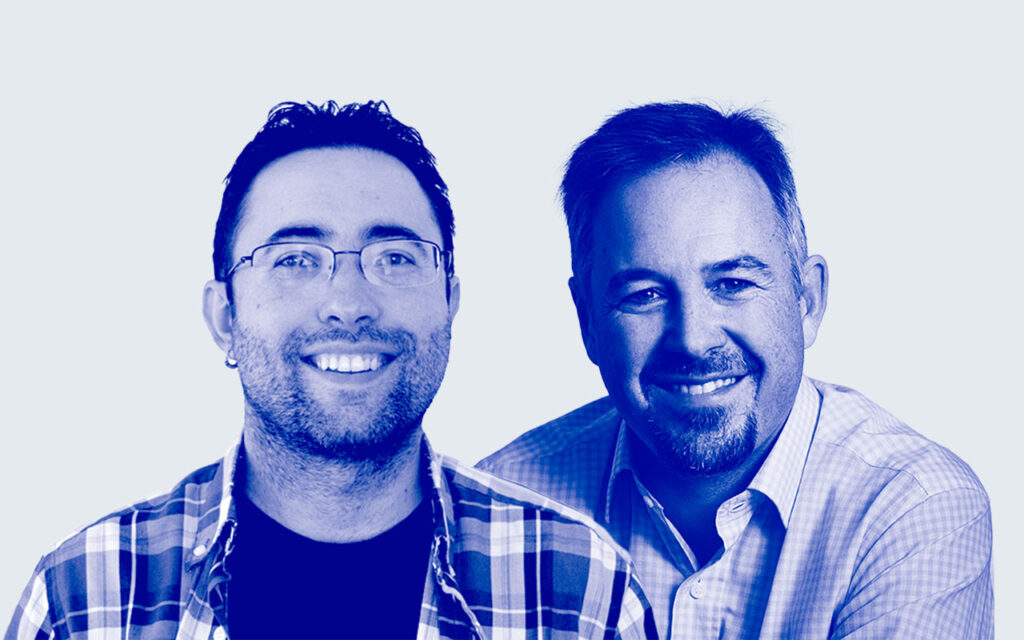
Pablo Mesejo and Óscar Cordón
1-Associate Professor at the Department of Computer Science and Artificial Intelligence (DECSAI) in the UGR
2- Professor and Founding Director of the Virtual Learning Center in the University of Granada (UGR)
ABOUT
PABLO MESEJO
Pablo Mesejo is Associate Professor at the Department of Computer Science and Artificial Intelligence (DECSAI) of the University of Granada (UGR, Spain). The main topic of his research is the analysis and design of machine learning, computer vision and computational intelligence methods able to solve image analysis problems, mainly related to the biomedical domain. During his career he has tackled numerous challenging problems, e.g. the automatic segmentation of anatomical structures in biomedical images (PhD at University of Parma, Italy, performed as a Marie Curie Early Stage Researcher, 2010-13), the classification of gastrointestinal lesions from endoscopic videos (postdoc at University of Auvergne, France, in a research lab belonging to CNRS, 2013-14), the estimation of biophysical parameters from fMRI signals (postdoc at Inria, France, 2014-16), and the integration of deep learning into probabilistic generative models for visual and audio recognition in human-robot interaction (starting researcher position at Inria, 2016-18), among others. He joined the UGR in April 2018 as a Marie Curie Experienced Researcher (highly competitive research grants that presented a 13.10% success rate in the H2020-MSCA-IF-2016 call). His Marie Curie proposal Skeleton-ID, specifically dealt with the application of AI techniques to the comparison of radiographs in forensic human identification. He is co-founding partner and chief AI officer of Panacea Cooperative Research, vice-chair of the IEEE Computational Intelligence Society (CIS) Task Force on Evolutionary Computer Vision and Image Processing (chair from 2018 to 2021), member of the IEEE CIS Task Force on Evolutionary Deep Learning and Applications, Associate Member of the American Academy of Forensic Sciences (AAFS, Digital and Multimedia Sciences Section), and member of the Andalusian Research Institute on Data Science and Computational Intelligence (DaSCI).
ÓSCAR CORDÓN
Oscar Cordón received his Ph.D. (1997) in Computer Science from the University of Granada, Spain, where he is a Professor (2011-) and was Founding Director of the Virtual Learning Center (2001-05) and Vice-President for Digital University (2015-2019). He was a founding researcher of the European Centre for Soft Computing (2006-2015). He was awarded with the IEEE CIS Outstanding Early Career Award (2011), the Spanish National Award on Computer Science ARITMEL (2014), the IEEE Fellow grade (2018), the IFSA Fellow (2019), the Recognition of the Spanish AI Association (AEPIA) for his Scientific Career and the Promotion of AI (2020), the IX ICT Spanish University of Universities (CRUE TIC) IT Professional Career Award (2022), and the Granada Ciudad de la Ciencia y la Innovaci n Award to Knowledge Transfer (2022), among other recognitions. He was a member of the High-Level Expert Group that elaborated the Spanish R&D Strategy on AI (2019). He has published >400 scientific publications (including 126 JCR-SCI-indexed journal papers), advised 22 Ph.D. dissertations, coordinated 41 research projects and contracts (with an overall amount of ~10M ), and has a granted international patent under exploitation on an intelligent system for forensic identification. He is included in the 1% of most-cited researchers in the world (source: Web of Science) and in the Top 2% of the most cited researchers in the world in Artificial Intelligence (source: Ranking of the World Scientists: World’s Top 2% Scientists , University of Stanford-Elsevier).
CONFERENCE
Artificial Intelligence (AI) is the science and engineering of creating machines that solve tasks in such a way that, if a human being solved them that way, he/she would be said to be intelligent. It is a broad field of knowledge that includes, without any claim of exhaustivity, machine learning, computer vision, natural language processing and automated planning, among others, and whose usefulness and applicability in numerous areas is well-known (from self-driving cars to biomedical diagnosis, from domestic cleaning to the development of humanoid robots for social interaction). In this talk we will focus on the application of certain AI techniques to forensic human identification and, mainly, craniofacial identification. We will see how AI technologies as fuzzy sets and systems, evolutionary computation, deep learning and computer vision can contribute to the automation of forensic identification by means of craniofacial superposition ranging from automatically locating cephalometric landmarks and obtaining the skull-face overlay to estimating soft tissue thickness and subject-to-camera distance, as well as providing support in the whole forensic decision making process. We will also focus on comparative radiography where deep learning can help in the automatic and accurate segmentation of radiographs, and evolutionary image registration can develop the automatic superimposition between the ante-mortem and post-mortem segmented structures in an automatic fashion. In addition, we will also introduce some deep learning applications to the analysis of 3D bone models, or even simulate age progression in facial images. We will end the talk with a presentation of the main challenges, limitations and opportunities that AI offers in the forensic field.